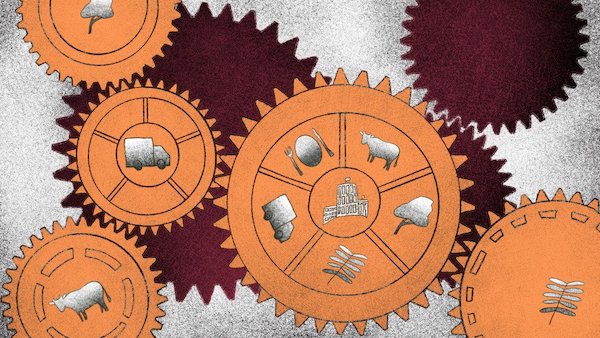
CAN A FIRST-EVER FOOD SYSTEMS SUMMIT HELP REDUCE RISING HUNGER?
THIN LEI WIN
ROME--- 'The global community needs to get serious about taking a different approach.'
With at least 34 million people said to be one step away from famine , and hundreds of aid organisations warning this week that “these people are not starving, they are being starved”, the stakes couldn’t be higher as the UN builds towards its first-ever Food Systems Summit .
Conference organisers and participants hope the September gathering will dramatically transform the production and consumption of food , helping the world learn how to feed itself in a way that is less ineffective, less unequal, and less environmentally destructive.
-
At a glance: What's in store?
- First world summit ever to look at farm-to-fork food issues due in September.
- It aims to tackle the converging pressures of food consumption, food production, and climate change.
- The role of agribusiness at the gathering is already under fire.
- Humanitarian actors are being urged to widen their “lens”.
- Consultations are underway on a broad-based approach before a July pre-summit.
The idea, they say, is to look at the interlinked issues of food insecurity, climate change, and conflict through a “food systems” lens, examining topics from famine to obesity, from degraded lands to depleted oceans.
The main event will take place – in person, it is hoped – on the sidelines of UN General Assembly meetings in September, but a three-day “ pre-summit ”, scheduled for July in Rome, is expected to set the tone and ambitions for those discussions.
The landmark summit comes against the backdrop of growing hunger around the world, with food prices rising, job losses soaring, and a widening gap between humanitarian funding and needs.
More than 250 aid groups and civil society organisations assisting people facing hunger in hotspots around the world called this week in an open letter to global leaders to “act now” and come up with $5.5 billion in emergency food assistance funding.
“These girls and boys, men and women, are being starved by conflict and violence; by inequality; by the impacts of climate change; by the loss of land, jobs or prospects; by a fight against COVID-19 that has left them even further behind,” the letter said.
Agribusiness takeover fears
The run-up to the event has been marred by tensions around the aims, the main players, and the anticipated outcomes. Some farming organisations and human rights groups, accusing others of a “corporate takeover”, are calling for a boycott and saying they are making plans for parallel discussions . Some food-focused NGOs are also sceptical and want more details.
“What is the main goal of the summit and what would be the outcome? So far, we do not have any concrete elements,” Pauline Verrière, head of the food systems and climate crisis division at Action contre la Faim (ACF), told The New Humanitarian. “We are really afraid the summit is driven by [the] private sector, with technical solutions, especially regarding agriculture.”
Technology-based solutions that benefit bigger farms and companies shouldn’t be the only options on the table, said analyst and summit adviser Olivier De Schutter.
“For small-scale farmers working in the most difficult environments, with weak connections to markets, those technologies will deliver much less and we need other solutions for them,” said De Schutter, co-chair of the International Panel of Experts on Sustainable Food Systems (IPES-Food).
Critics say that if agricultural technology is unchecked, less affluent farming communities could lose their “food sovereignty” – control over the way food is produced, traded, and consumed – to private corporations. This could further impoverish farming families who already struggle to make a living.
Agnes Kalibata, the summit’s special envoy, denied that agribusiness is running the summit behind the scenes.
The process, Kalibata told The New Humanitarian, is meant to build “stronger, healthier, more inclusive, nutritious, and resilient food systems” over the next decade that could change the lives of nearly 700 million people who are going hungry, and reduce food-related greenhouse gas emissions.
Farmers and civil society organisations make up about a third of the groups leading the summit’s five work streams , while the rest are academics, researchers, government representatives, and youth organisations.
A new crunch, a new lens
Global hunger levels have been rising since 2014, and things are getting worse.
“Never before have we faced a humanitarian crisis of this magnitude,” Cathy Bergman, director for food security and nutrition at Mercy Corps, told The New Humanitarian. “Extreme poverty is on the rise for the first time in two decades… We may well see a historic decline in peoples’ abilities to feed themselves and their families in the months and years to come.”
“Between COVID-19, protracted conflicts, and the seemingly unstoppable march of the climate crisis, food production and distribution is being affected in ways we’ve never seen before.”
After years of decline, the World Bank expects the number of people living in extreme poverty to have risen by at least 143 million by the end of 2021 due to the pandemic. Food needs dominate the costs of humanitarian funding appeals, and the UN has said one in 33 people worldwide require humanitarian assistance this year , the highest in decades.
Meanwhile, the world’s food systems are responsible for 34 percent of the global emissions heating up the planet, according to a recent study by the European Commission’s Joint Research Centre and the FAO, the UN’s food and agriculture agency.
“Between COVID-19, protracted conflicts, and the seemingly unstoppable march of the climate crisis, food production and distribution is being affected in ways we’ve never seen before,” Bergman said. “The global community needs to get serious about taking a different approach.”
-
The five “action tracks”
- Ensure access to safe and nutritious food for all.
- Shift to sustainable consumption patterns.
- Boost nature-positive production.
- Advance equitable livelihoods.
- Build resilience to vulnerabilities, shocks and stress.
A “food systems” approach looks at all the interlinked issues rather than just farming or trade.
“Food production impacts water consumption; water consumption impacts energy interests; energy issues impact labour; labour impacts health; health impacts productivity, and so-on,” explained Chris Hegadorn, secretary of the Rome-based Committee on World Food Security (CFS), a UN grouping.
The summit is organised around five interconnected themes . These include: ensuring access to safe and nutritious food for all; and building resilience to vulnerabilities, shocks and stresses. Experts such as De Schutter and Saleemul Huq, director of the International Centre for Climate Change and Development (ICCCAD) in Bangladesh, have been assigned to lead consultations and dialogues that have been going on since late last year.
“I’m not a food systems person,” said Huq, who co-chairs the resilience track. “I’ve been working on communities and countries most vulnerable to climate change and, as it happens, they are almost the same in terms of vulnerability to food systems and to COVID-19.”
Shifting humanitarian responses
Using a food systems approach also means aid agencies combatting food insecurity would need to shift their focus, said Christophe Bene, Colombia-based senior policy expert with the Alliance of Bioversity International and CIAT.
The image of poor, isolated farmers and communities going hungry because they cannot produce enough food is incomplete and outdated, said Bene, who led a recent study on COVID-19’s impacts on hunger. “Even a community in the valley of Afghanistan… they also depend on the local food system to produce, transport, supply that food.”
Mercy Corps’ Bergman said any summit would be “toothless” unless it came up with commitments to instigate systemic change in food systems, accountability for such commitments, and mechanisms to measure progress.
Michael Fakhri, the UN special rapporteur on the right to food, said aid agencies need to make the right to food more central in guiding humanitarian assistance, for example by building supply chains that are fair, transparent, and support local markets and food producers. He also said they needed to be watchful of the long-term implications of emergency food aid.
“Famine has always been a problem of political failure, not lack of food, unavailable food or inadequate supply,” Fakhri told The New Humanitarian. “The issue is never a matter of supply. It's always a matter of politics.”
A difficult beginning
As well as allegations that agribusiness is in the driving seat, the choice of Kalibata, a former Rwandan agriculture minister, as summit envoy has come under fire. One critic accused her of having pushed Africa towards unsustainable and environmentally-damaging agricultural practices as president of the Alliance for a Green Revolution in Africa (AGRA).
Farmers’ group La Via Campesina (LVC), meanwhile, commented that the summit had been prompted by the World Economic Forum , “a private sector organisation representing global corporate interests”, instead of an intergovernmental decision.
“This summit – the way it has been launched, developed, promoted – it’s not the space or conversation that we think would go in the direction we are putting forward,” said Paula Gioia, a small-scale farmer from Germany and member of LVC’s International Coordination Committee.
“The issue is never a matter of supply. It's always a matter of politics.”
In February, the Civil Society and Indigenous Peoples’ Mechanism (CSM), a group of more than 500 organisations, including LVC, laid down conditions for their participation . Martin Wolpold-Bosien, coordinator of the CSM Secretariat, said in an email, “The CSM cannot jump onto a train that is heading in the wrong direction.”
Verrière from ACF, which is also part of the CSM, said the process has not been inclusive, and pointed to the lack of translation of documents and at events as a small but concrete example. “Not every organisation has the capacity to have people who are able to follow such discussions in English,” she said. “It could be seen as a detail, but actually it's really important.”
Groups such as CSM fear the summit will not adequately address the role corporations play in causing many of the current problems in food systems, said Fakhri.
Kalibata welcomed the opportunity to meet with the CSM: “The ideas and opinions of so many women, youth, Indigenous groups, civil society groups, and many vulnerable or marginalised communities have been historically ignored and overlooked,” she said. “The summit cannot change the past, but it can help to shift us into a better, more inclusive course for the future.”
‘Innovative format’
These pre-summit disagreements have received plenty of attention , but both De Schutter and Fakhri stressed that they don’t necessarily denote failure.
“It's not a bad thing that the summit organisers and participants have this external pressure,” said De Schutter. “It places the bar high, as it should be,” and strengthens the hand of those within the process to push for more progressive solutions, he added.
“My worry is if, after the summit, one of the new relationships that comes out is that the business sectors have more control over the agenda of the food systems,” warned Fakhri.
Both expectations and fears are running high, and there is suspicion on all sides, not least because the summit is embarking on an “innovative format”, according to ICCAD’s Huq.
Instead of government representatives negotiating over a text, they are holding dialogues at national, regional, and international levels and soliciting solutions from everyone .
“The premise is that the negotiation between governments has already been assumed to have been completed with the Sustainable Development Goals and the Paris [Climate] Agreement, so it's about looking at how to build on those agreements in terms of actions and things to do,” Huq said.
“We do listen to the governments, but the governments don't tell us what to do. We also have to listen to farmers, fishers, [the] private sector… and a variety of different stakeholders, which is what we have been doing,” he added. “Hopefully, [the outcome] will be a set of interesting and new ways of doing things and new coalitions of people. If we can pull it off, it will be a game-changer.”

